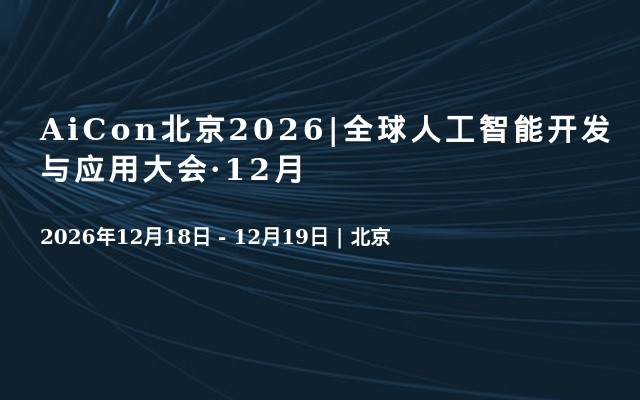第17届国际空间数据处理大会
时间:2016-08-18 08:00 至 2016-08-20 18:00
地点:北京

- 我要咨询
- 会议通知
- 会议日程
- 会议嘉宾
- 会议门票
-
手机下单


|
第17届国际空间数据处理大会 已截止报名
会议时间: 2016-08-18 08:00至 2016-08-20 18:00结束 主办单位: IGU-地理信息科学委员会 IGU-地理系统建模委员会 中国科学院地理科学与资源研究所 资源与环境信息系统国家重点实验室 |
 会议通知
会议通知
国际空间数据处理大会由国际地理联合会(IGU)下的地理信息科学(IGU-GIScience)委员会和地理系统建模(IGU-CMGS)委员会共同发起的国际会议,是GIS领域最早和最有代表性的国际会议之一。第17届国际空间数据处理大会(17th International Symposium on Spatial Data Handling)将于2016年8月18-20日在北京召开。
主办:
中国科学院地理科学与资源研究所,资源与环境信息系统国家重点实验室
IGU-地理信息科学委员会
IGU-地理系统建模委员会
主题 :
Face the Challenges of Big Data within GIS
会议名称:第17届国际空间数据处理大会(17th International Symposium on Spatial Data Handling)
会议时间:2016年18-20日
会议地点:北京
查看更多
 主办方:中国科学院地理科学与资源研究所
主办方:中国科学院地理科学与资源研究所
介绍:中国科学院地理科学与资源研究所(INSTITUTE OF GEOGRAPHIC SCIENCES AND NATURAL RESOURCES RESEARCH,CAS)于1999年9月经中国科学院批准,由中国科学院地理研究所(前身是1940年成立的中国地理研究所)和中国科学院自然资源综合考察委员会(1956年成立)整合而成,并纳入中国科学院知识创新工程试点。
 主办方:资源与环境信息系统国家重点实验室
主办方:资源与环境信息系统国家重点实验室
介绍:资源与环境信息系统国家重点实验室(中国科学院地理科学与资源研究所)是中国最早的国家重点实验室之一,也是国际上成立最早的地理信息系统研究机构之一,为中国地理信息系统研究的开拓者,是国际开放地理信息委员会的成员单位,以地球信息科学的应用基础研究为核心,从国家国民经济发展、生态环境保护与区域可持续发展之需要出发,建立地球信息科学的应用基础理论,探讨数字地球发展战略与国家对策,发展技术示范系统,促进地球科学数据集成与共享,享誉国内外。
 会议日程
(最终日程以会议现场为准)
会议日程
(最终日程以会议现场为准)
Priliminary Programme
Thursday, Aug 18, 2016
Venue: Conference Hall 2602
07:00~09:00 Onsite registration
09:30~10:00 Opening ceremony
10:00~10:15 Tea break
10:15~11:00 Keynote speech
Leveraging big (geospatial) data with (geo) visual analytics.
by Prof. Alan MacEachren.
11:00~11:45 Keynote speech
Error in spatial ecology,.
by Prof. Brian Lees.
Lunch time
Session 1 (Room 2209): Geographic knowledge discovery and data mining(I)
14:00~14:20 Mapping Brazilian regional economic social inequalities using GIS, and principal component analysis
Joao de Abreu (Pontifical Catholic University of Minas Gerais-Brazil, Brazil), Jose Paiva (Federal University of Minas Gerais-Brazil, Brazil).
14:20~14:40 The impacts of temporal sampling intervals on human mobility studies using mobile phone location data
Zhiyuan Zhao (Wuhan University, China), Ling Yin (Shenzhen Institute of Advanced Technology, Chinese Academy of Sciences, China), Zhixiang Fang (Wuhan University, China), Shaw (University of Tennessee, USA), Xiping Yang (Wuhan University, China).
14:40~15:00 Determining the optimal spatial configuration of hospitals in reducing urban traffic congestion: a case study of Beijing
Yuxai Wang (Peking University, China),Yu Liu (Peking University, China), Di Zhu (Peking University, China).
15:00~15:20 Investigating public facility characteristics from a perspective of spatial interaction: a case study of Beijing hospitals using taxi data
Xiaoqing Kong (Capital Normal University, China),Yu Liu (Peking University, China).
15:20~15:40 Street perspective: a novel spatial unit in urban social sensing
Di Zhu (Peking University, China),Yu Liu (Peking University, China).
15:40~15:55 Tea break
15:55~16:15 Measuring walkability using distance to public schools in lahore city of Pakistan
Hafiza Tehmina Anwar (University of the Punjab, Pakistan), Sajid Rashid Ahma (University of the Punjab, Pakistan), Adeel Ahmad (University of the Punjab, Pakistan), Shoaib Khalid (University of the Punjab, Pakistan).
16:15~16:35 An integrated geodatabase for geological disposal of high level radioactive waste in China
Peng Wang (Beijing Research Institute of Uranium Geology, China), Shutao Huang (Beijing Research Institute of Uranium Geology, China), Min Gao (Beijing Research Institute of Uranium Geology, China), Lun Wu (Peking University, China).
16:35~16:55 Research and prediction on time-sequence characteristics of group-user access behavior
in public map service
Zhaohui Liu (Wuhan University, China), Rui Li (Wuhan University, China), Huayi Wu (Wuhan University, China).
16:55~17:15 Learning geography of urban emotions through sentiment analysis of geo-referenced tweets
Yeran Sun (Urban Big Data Centre, University of Glasgow, United Kingdom).
Session 2 (Room 2421): Big geographical data storage and data-Intensive Computing
14:00~14:20 Representing interconnected geographical processes for organizing big data and knowledge discovery: examples in drought and flood risk assessment
Chaoqing Yu (Tsinghua University, China).
14:20~14:40 The progress in computing theory of geosensor networks and its service in monitoring and early warning of the geohazard in mines
Jin Zhang (Taiyuan University of Technology, China).
14:40~15:00 Using an open source platform for performance evaluation of geospatial big data processing
Mudabber Ashfaq (National University of Sciences and Technology, Pakistan), Ali Tahir (National University of Sciences and Technology, Pakistan), Gavin McArdle (University College Dublin, Ireland), Michela Bertolotto (University College Dublin, Ireland).
15:00~15:20 Research on geo-information data model for pre-selected areas of geological disposal of high-level radioactive waste
Min Gao (Beijing Research Institute of Uranium Geology, China), Shutao Huang (Beijing Research Institute of Uranium Geology, China).
15:20~15:40 Develo ent of a dataset of supply relationship between glaciers and lakes on Tibetan Plateau
Beibei Ai (Institute of Geographic Sciences and Natural Resources Research, CAS, China), Chengzhi Qin (Institute of Geographic Sciences and Natural Resources Research, CAS, China), Qinghua Ye (Institute of Tibetan Plateau Research, CAS, China).
15:40~15:55 Tea break
15:55~16:15 Application patterns research of the pipeline detection project based the construction of big geological data platform
Zhiqi Qian (Geological Exploration Technology Institute of Jiangsu Province, China), Guohua Wu(Ke Du Technology Co., Ltd. of Hangzhou, China), Zicheng Fen (Geological Exploration T echnology Institute of Jiangsu Province, China), Yingying Fang (Geological Exploration Technology Institute of Jiangsu Province, China).
16:15~16:35 An innovative parallel ant colony algorithm and its application in redistricting problems
Kai Cao (National University of Singapore, Singapore).
16:35~16:55 Big Geodata and watershed flood hazard-impact-response interaction modeling
Shanzhen Yi (Huazhong University of Science and Technology, China), Zhongqian Tang (Huazhong University of Science and Technology China).
16:55~17:15 Rethinking big data: A review on the data quality and usage issues
Jianzheng Liu (The University of Hong Kong, China) , Jie Li (The University of Hong Kong, China), Weifeng Li (The University of Hong Kong, China), Jiansheng Wu (Peking University, China).
Friday, Aug 19, 2016
Session 3 (Room 2209): Geographic knowledge discovery and data mining(II)
08:30~08:50 The exploration about the realationship between data quality of OpenStreetMap and road
density
Li Yu (China University of Geosices, China), Qi Zhou (China University of Geosices, China).
08:50~09:10 Spatial variations in self-containment of employment based on mobile phone location data
Xingang Zhou (The University of Hong Kong, China), Anthony Gar-On Yeh (The University
of Hong Kong, China), Yang Yue (Shenzhen University, China).
09:10~9:30 Evaluate uniqueness from social ties and locations using mobile phone data
Shi Li (Peking university, China), Yu Liu (Peking university, China).
09:30~09:50 Mining vehicle traces for validation and update of OpenStreetMap road network
Xiang Zhang (Wuhan University, China), Chuanxiuyue He (Wuhan University, China), Zhendong Yuan (Wuhan University, China), Zhenyu Hu (Wuhan University, China).
09:50~10:10 Analysis of node locations in OSM: A spatio-temporal accuracy approach
Talia Dror (The Technion, Israel), Yerach Doytsher (The Technion, Israel),Sagi Dalyot (The Technion, Israel).
10:10~10:25 Tea break
10:25~10:45 The Detection and Update of Transport Land-use Data Using Crowdsourcing Movement Trajectory
Wei Yang (WuHan University, China),Tinghua Ai (WuHan University, China).
10:45~11:05 A framework for event information extraction from Chinese news online
Shuang Wang (Information Engineering University, China), Yecheng Yuan (Institute of Geographical Sciences and Natural Resources Research, CAS, China), Tao Pei (Institute of Geographical Sciences and Natural Resources Research,CAS, China), Yufen Chen (Information Engineering University, China).
11:05~11:25 Influential factors of building footprint location and predictions of office shape in a city-block in Tokyo commercial zones
Masahiro Taima (The University of Tokyo, Japan), Yasushi Asami (The University of Tokyo, Japan), Kimihiro Hino (The University of Tokyo, Japan).
11:25~11:45 Detection of user route deviation from navigational instructions
Lijuan Zhang (The Technion Israel Institute of Technology, Israel), Sagi Dalyot (The Technion Israel Institute of Technology, Israel).
Session 4 (Room 2421): Geo-visualization and data representation
08:30~08:50 A hybrid WD-SVR-MA model for the short-term prediction of service-time
GuangSheng Dong (Wuhan University, China), Rui Li (Wuhan University, China), Huayi Wu (Wuhan University, China).
08:50~09:10 Improving giscience visualization: ideas for a new methodology
Francis Harvey (Leibniz Institute for Regional Geography, Germany).
09:10~09:30 A simplification of residential feature based on shape cognition and template matching
Xiongfeng Yan (Wuhan University, China), Tinghua Ai (Wuhan University, China), Min Yang (Wuhan University, China).
09:30~09:50 Research on 3D modeling of great wild goose pagoda based on massive point cloud data
Xiaohu Lin (Xi’an University of Science and Technology, China).
09:50~10:10 Datahandling for evaluating neighborhood environment and daily walking behavior
Hao Hou (University of Tsukuba, Japan), Yuji Murayama (University of Tsukuba, Japan).
10:10~10:25 Tea break
10:25~10:45 A space-time GIS for visualizing and analysing clusters in large tracking datasets
Hongbo Yu (Oklahoma State University, USA).
10:45~11:05 Coverage degree-based fuzzy topological relationships for fuzzy regions
Anderson Chaves Carniel (University of São Paulo, Brazil), Markus Schneider (University of Florida, USA).
11:05~11:25 Scientific paradigm of cartography
Xianyong Gong (Zhengzhou Institute of Surveying and Mapping, China), Fang Wu (Zhengzhou Institute of Surveying and Mapping, China), Jinghan Li (Zhengzhou Institute of Surveying and Mapping,China), Ruixing Xing (Zhengzhou Institute of Surveying and Mapping, China).
11:25~11:45 Classifying natural-language spatial relation terms with random forest algorithm
Xiaonan Wang (Peking University, China), Shihong Du (Peking University, China).
Lunch time
Session 5 (Room 2209): Multi-scale spatial data model and allgorithm
14:00~14:20 Analyzing the uncertainties of ground validation for remote sensing land cover mapping in the era of big geographic data
Bo Sun (Center for Geo-spatial Information, Shenzhen Institutes of Advanced Technology (SIAT), Chinese Academy of Sciences, China), Xi Chen (Xinjiang Institute of Ecology and Geography, Chinese Academy of Sciences, China), Qiming Zhou (Hong Kong Baptist University, China).
14:20~14:40 Accurate computatation on dem visibility by ray casting
Jieqing Yu (China University of Mining & Technology, China), Lixin Wu (China University of Mining & Technology, China).
14:40~15:00 A comparative study of various properties to measure the road rank in road network
Xun Wu (SouthWest Jiaotong University/Faculty of Geosciences & Environmental Engineering, China), Hong Zhang (SouthWest Jiaotong University, China), Yunhui Xu (SouthWest Jiaotong University, China).
15:00~15:20 Finding parameter-specific distance metrics for geographically weighted regression
Binbin Lu (Wuhan University, China), Huabo Sun (China Academy of Civil Aviation Science and Technology, China),Chris Brunsdon (National Centre for Geocomputation, Maynooth University, Ireland), Martin Charlton (National Centre for Geocomputation, Maynooth University, Ireland), Paul Harris (Roth sted Research, United Kingdom).
15:20~15:40 Detail resolution: a new model to describe level of detail information of vector GIS data
Xiaoqiang Cheng (Wuhan University, China), Huayi Wu (Wuhan University, China), Tinghua Ai (Wuhan University, China), Min Yang (Wuhan University, China).
15:40~15:55 Tea break
15:55~16:15 The potential of proactive role of citizens. Geo-information and communication technology in crisis management.
Elena Pede (Politecnico di Torino, Italy), Åke Sivertun (Swedish Defence University, Sweden), Aida Alvinus (Swedish Defence University, Sweden).
16:15~16:35 Implementation of levels of detail dem model based on error control
Qingguo Wang (Wuhan University of Science and Technology, China).
16:35~16:55 Automatic generation of lane~level ribbon road network from road marking data
Teng Zhong (The University of Hong Kong, China), Xiaohu Zhang (Faculty of Architecture, The University of Hong Kong,China), Anthony Gar~On Yeh (The University of Hong Kong, China).
16:55~17:15 A design of uav multi-lens camera system for 3d reconstruction during emergency response
Junhui Wu (Graduate School at Shenzhen, Tsinghua University, China), Fei Wang (Graduate School at Shenzhen, Tsinghua University, China), Xiaocui Zheng (Graduate School at Shenzhen, Tsinghua University, China).
17:15~17:35 Order classification of watershed divide lines with dem
Boris Gartsman (Water Problems Institute RAS, Russian), Eugenii Shekman (Pacific Geographical Institute FEB RAS, Russian).
Session 6 (Room 2421): Geospatial analysis
14:00~14:20 Simulation of urban expansion and encroachment using cellular automata and multi~agent system model : a case study of tianjin metropolitan region, China
Guangjin Tian (School of Environment Beijing Normal University, China).
14:20~14:40 Modelling urban growth evolution using sleuth model the case of wuhan city, China
Wenyou Fan (China University of geoscience, China), Yueju Shen (China University of geoscience, China).
14:40~15:00 The space distribution research on the bushwood in sichuan province
Wuxue Cheng (Sichuan Normal University, China).
15:00~15:20 Urban growth evaluation: a new approach using neighborhood characteristics of remotely sensed land use/cover
Shyamantha Subasinghe (University of Tsukuba, Japan), Yuji Murayama (University of Tsukuba, Japan).
15:20~15:40 Research of comparative analysis of clustering algorithm based on raster data
Jingyi Liu (China University of Petroleum (East of China), China), Cunjin Xue (Institute of Remote Sensing and Digital Earth, Chinese Academy of Sciences, China), Xiaoli Zheng (Institute of Remote Sensing and Digital Earth, Chinese Academy of Sciences, China), Yue Li (China University of Petroleum (East of China), China).
15:40~15:55 Tea break
15:55~16:15 A measure of spatial stratified heterogeneity
Jinfeng Wang (CAS, China).
16:15~16:35 The spatial analysis of pedestrian shed under the high risk of road Traffic accidents in faisalabad city of Pakistan
Muhammad Sajjad (Coastal and Ocean Management Institute, College of Environment and Ecology, Xia’en University, China), Fariha Shoaib (Government College University, Faisalabad, Pakistan /Nanjing University, China ), Tianlu Qian (Nanjing University, Nanjing, China), Huang Huang (Nanjing University,Nanjing,China), Shoaib Khalid (Government College University, Faisalabad, Pakistan /Nanjing University, Nanjing, China).
16:35~16:55 Bayesian inference for spatial point process with nonparametric intensity based on fourier series
Huifang Zeng (Hunan University of Science and Technology, China).
16:55~17:15 Geospatial characterization of fractures in rock based on GIS technology
Peng Wang (Beijing Research Institute of Uranium Geology, China), Xiyong Wang (Beijing Research Institute of Uranium Geology, China), Xiaozhao Li (Nanjing University, China).
Saturday, Aug 20, 2016
Venue: Conference Hall 2602
08:30~09:10 Keynote speech
GIScience beyond conventional spatial data handling
by Prof. Shih-Lung Shaw.
09:10~09:50 Keynote speech
by Prof. Chenghu Zhou.
09:50~10:05 Tea break
10:05~10:35 Closing ceremony
查看更多
 会议嘉宾
(最终出席嘉宾以会议现场为准)
会议嘉宾
(最终出席嘉宾以会议现场为准)
会议门票
Student rates are available only to full time students enrolled in a recognized higher education course at university.
| Category | by Mar.31, 2016 | by July 15, 2016 | after July 15, 2016 |
| Regular | 2500 RMB | 2800 RMB | 3000 RMB |
| Student | 1800 RMB | 2000 RMB | 2200 RMB |
Cancellation and Refund Policy:
To cancle your registration and get the refund of the registration fee, send an email stating your intent to sdh2016@lreis.ac.cn. If notice of cancellation is received by May 1, 2016, 25% cancellation fee will be charged. If notice of cancellation is received by July 31, 2016, 50% cancellation fee will be charged. No refunds are available for cancellations notified after July 31, 2016.
查看更多
温馨提示
酒店与住宿:
为防止极端情况下活动延期或取消,建议“异地客户”与活动家客服确认参会信息后,再安排出行与住宿。
退款规则:
活动各项资源需提前采购,购票后不支持退款,可以换人参加。
 您可能还会关注
您可能还会关注
-
AiCon北京2026|全球人工智能开发与应用大会·12月
2026-12-18 北京
-
AICon上海2026|全球人工智能开发与应用大会
2026-06-26 上海
-
2025华夏企业家年会暨第九届中国品牌年度人物盛典
2026-02-05 福州
-
QCon上海2026|全球软件开发大会
2026-10-22 上海



.jpg!hdj123)










 赞助
赞助